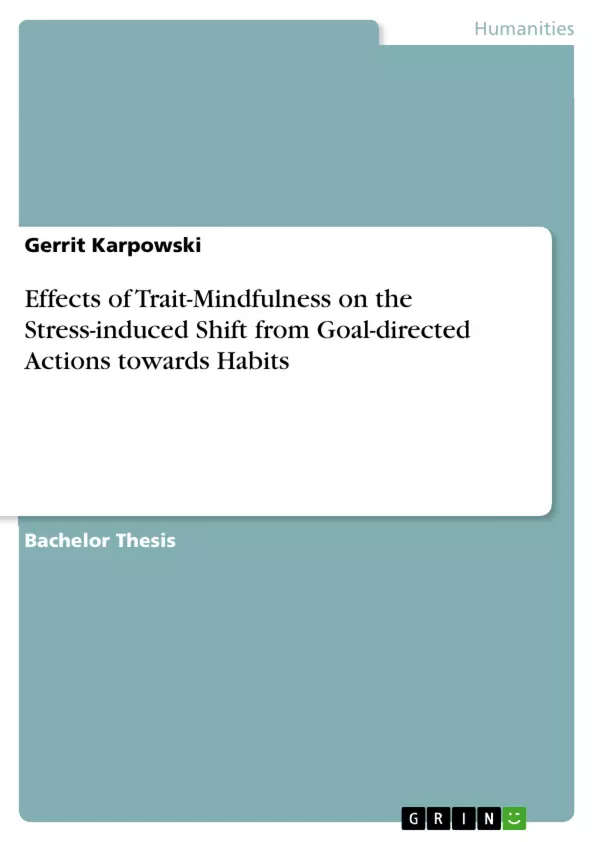Individuals differ in their tendency to shift towards habitual behavior after stress. Mindfulness is an individual characteristic that does not only influence the stress response, but also cognitive processes. Therefore, effects of trait-mindfulness on the balance between goal-directed and habitual behavior after a stress induction were investigated. During this study, forty-seven healthy male and female participants mainly without meditation experience, were exposed to either a laboratory acute stress induction or a control procedure before they performed in a two-staged instrumental learning paradigm and completed a mindfulness questionnaire. Participants learned the acquired discriminations and a congruence effect, as predicted, was found. Moreover, explicit knowledge was highly indicative of level of goal-directedness. The stress manipulation was successful. Stressed individuals did not shift more towards habits. Mindfulness did not predict the level of goal-directedness, neither did it affect stress responses. Future studies might incorporate a mindfulness intervention or compare differently experienced meditators. This could help to approve mindfulness as a potential intervention to reduce cognitive shifts towards habits, which play a major role in development of pathological behavior.
Inhaltsverzeichnis (Table of Contents)
- Instrumental Learning
- Associative representations underlying instrumental behavior
- Detecting shifts towards habits
- Stress Affects the Balance Between Goal-directed and Habitual Control of Behavior
- Mindfulness
- Method
- Participants
- Design and Procedure
- Stress induction
- Subjective stress ratings
- Blood pressure
- Instrumental learning
- Slips-of-action test
- Explicit knowledge
- Assessing mindfulness
- Statistical Analysis
- Results
- Checking of Stress Manipulation, Instrumental Learning, and Mindfulness
- Stress
- Instrumental learning
- Slips of action
- Mindfulness
- Stress-induced Shift towards Habits
- Differential Stress Responses between more and less Mindful Individuals
- Moderation of Mindfulness on the Stress-induced Shift
- Discussion
- A Mediation Model
- Conclusion
- References
Zielsetzung und Themenschwerpunkte (Objectives and Key Themes)
This bachelor thesis investigates the effects of trait-mindfulness on the shift towards habitual behavior after stress induction. The study aims to determine whether individual differences in mindfulness influence the balance between goal-directed and habitual behavior, particularly in response to stress.
- Mindfulness and its influence on stress response and cognitive processes
- The relationship between stress and the shift from goal-directed actions to habitual behaviors
- The impact of mindfulness on the balance between goal-directed and habitual behavior in the context of stress
- Investigating the role of instrumental learning and its association with goal-directedness
- Analyzing the potential of mindfulness interventions to reduce cognitive shifts towards habits
Zusammenfassung der Kapitel (Chapter Summaries)
The thesis begins by providing an introduction to instrumental learning and its theoretical frameworks. It outlines the distinction between goal-directed and habitual behavior and the underlying neural substrates. The following chapter discusses the concept of mindfulness and its potential influence on stress responses. The methods chapter details the study design, including participant recruitment, stress induction procedures, instrumental learning tasks, and mindfulness assessment tools. Results are presented in the subsequent section, analyzing stress manipulation, instrumental learning performance, mindfulness levels, and the influence of mindfulness on stress-induced shifts towards habits. The final chapter concludes with a discussion of the findings, potential limitations, and future directions for research.
Schlüsselwörter (Keywords)
This work explores the relationship between mindfulness, stress, and the shift towards habitual behavior. Key themes include instrumental learning, goal-directedness, habits, and the potential of mindfulness as a possible intervention to reduce cognitive shifts towards habits.
Frequently Asked Questions
How does stress affect the balance between goal-directed and habitual behavior?
Stress can induce a cognitive shift, making individuals more likely to rely on habitual behaviors rather than goal-directed actions.
What is trait-mindfulness in the context of this study?
Trait-mindfulness is an individual characteristic that influences both the stress response and cognitive processes, potentially moderating the shift towards habits.
Did the study find that mindfulness prevents the shift to habits after stress?
In this specific study with 47 participants, mindfulness did not significantly predict the level of goal-directedness or affect the stress-induced shift towards habits.
What was the methodology used to detect habitual behavior?
The researchers used a two-staged instrumental learning paradigm and a 'slips-of-action' test to measure how much participants relied on habits versus explicit knowledge.
Can mindfulness interventions help reduce pathological behavior?
The study suggests that while trait-mindfulness showed no direct effect here, future research with experienced meditators might approve it as a potential intervention to reduce cognitive shifts towards habits.
- Quote paper
- Gerrit Karpowski (Author), 2016, Effects of Trait-Mindfulness on the Stress-induced Shift from Goal-directed Actions towards Habits, Munich, GRIN Verlag, https://www.grin.com/document/385877



